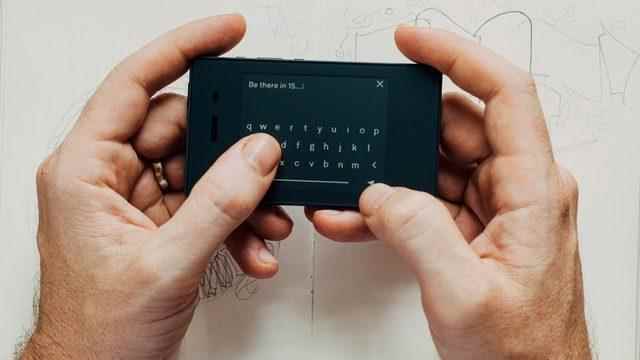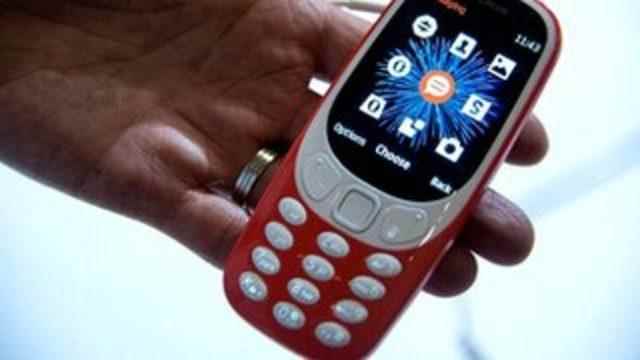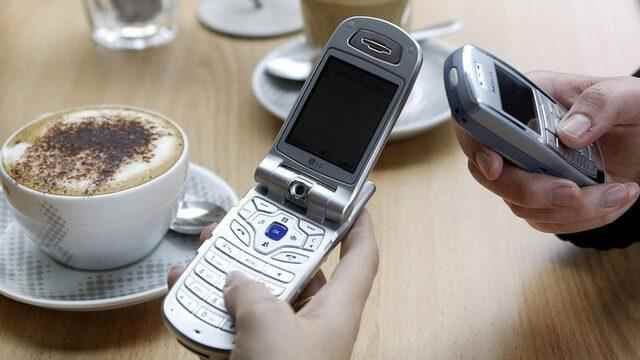17-year-old Robin West has a significant difference from the vast majority of his peers. Does not use smartphone.
Instead of surfing apps like TikTok or Instagram all day, he uses a “mindless” cell phone.
These are simple cell phones with very limited functionality compared to an iPhone, for example.
What you can do from a non-smart cell phone is usually limited to making and receiving phone calls, sending and receiving messages.
If you’re lucky, you can also listen to the radio from some models and take not-so-perfect pictures. But its main feature is not connecting to the internet or downloading applications.
These devices are similar to the first cell phones people acquired in the late 1990s.
Robin West went to the mall two years ago to replace his old smartphone with a new one. At a used phone shop, he suddenly realized how cheap a “bricky” old smart phone was and was tempted by it.
The mobile phone he is currently using and acquired for £8 is a device owned by the French company MobiWire. Since it does not have smartphone features, it does not worry about high bills every month.
“Until I got the brick phone, I didn’t realize how the smartphone had taken over my life,” she says. “There were a lot of social media apps and I couldn’t do anything because I was on the phone all the time.”
Young Londoner thinks he will never buy a smartphone again. “I’m happy with the brick. I don’t think it limits me. I definitely have a more active life,” she says.

Sales of smart phones seem to have revived in general. According to data from software company SEMrush, Google searches for smart phones on the internet also increased by 89 percent in 2021.
Sales figures are not easy to come by, but according to a study, global sales of smart phones reached one billion last year. That was around 400 million in 2019. For comparison, the number of smartphones sold last year was 1 billion 400 million. This indicates a 12.5% decrease compared to 2020.
Meanwhile, in 2021, finance company Deloitte revealed that one in 10 mobile phones used in the UK is a smart phone.
“It’s a kind of fashion, a nostalgia, and their appearance in TikTok videos also played a role in boosting sales,” says Ernest Doku, cell phone expert at price comparison site Uswitch.com.
“Many of us first cell phones were mindless. So it’s natural to feel a nostalgic affinity for these classic devices.”
Ernest Doku says that the 2017 re-release of the Nokia 3310, the best-selling mobile phone of all time, first launched in 2000, marks a real turning point in retrospect. “Nokia presented the 3310 as a cheap alternative to a market full of high-end phones,” he says.
Doku says that these smart phones cannot compete with the latest top models of Apple and Samsung in terms of performance and functionality, but they can be superior to them in two important areas, such as battery life and durability.
Five years ago, psychologist Przemek Olijniczak ditched his smartphone and replaced it with the Nokia 3310, prioritizing longer battery life. But he soon realized that this phone also had other advantages.

“Before I changed it, I was constantly glued to my phone. I was always checking everything, flipping through information on Facebook or the news or anything else I didn’t need to know about,” he says.
“Now I have so much more time for myself and my family. Not being dependent on liking, sharing, commenting on, or revealing details about my life to others is a great achievement. Now my private life is more my own.”
However, Olijniczak, who lives in Lodz, Poland, admits that it was difficult at first to get used to the change:
“I used to control everything from my smartphone when I was traveling. Buses, restaurants, everything. That’s not possible now. So now I’ve learned to do these kinds of things from home beforehand. I’m used to that too.”
One of the companies that produce mindless phones is the New York-based Light Phone.
They have products that are slightly smarter than ordinary smart phones. With these phones, you can listen to music and podcasts and connect your headphones to the phone via Bluetooth.
But the company promises that their phones will “never connect to social media, news sites, e-mail, internet search engines, or unrestricted streams that worry people.”

The company says that 2021 was its most profitable year, with its sales up 150 percent compared to 2020. Moreover, Light Phone phones are more expensive than other smart phones. Prices start at $99.
Kaiwei Tang, one of the founders of the company, explains that they first designed the device as a second phone. For example, for users who want to put their smartphones aside for the weekend. But he says that half of those who buy cell phones now use it as their main phone.

“If aliens were born, they might think that the cell phone is a superhuman type that keeps humans in check,” says Tang.
“And that’s not going to stop there. It’s going to get worse. Consumers are starting to realize something is wrong, and we want to offer choice.”
Another surprising thing is that according to Tang’s information, those who use these phones are mainly in the 25-35 age group. Tang explains that he expects his clients to be much older.
Oxford University Technologist Professor Sandra Wachter thinks it’s understandable that some of us want to go back to simpler cell phones:
“Right now, it would not be wrong to say that making phone calls and texting with a smartphone has become a side feature. Your smartphone is your means of spending time, getting news, traveling, organizing your daily work, learning things you don’t know, and your wallet.”
Wachter adds that smartphones constantly want to “grab your attention” with notifications, updates, breaking news, and are constantly infiltrating your daily life.

Professor Wachter said: “It’s very common for some of us to turn to simpler technologies and think that they can make their lives simpler with smart phones. This can give us the time we need to focus fully on one subject and work with much more concentration. It can even reduce people’s anxiety. Research shows that too many choices are unhappiness,” said Professor Wachter. and it can create a state of extreme excitement,” he adds.
Young Robin West, happy with his smart phone in London, says many people don’t understand why he chose such a phone. “Everybody thinks it’s going to be a temporary thing, they keep asking when they’re going to buy a smartphone,” he says.
Will Smale, editor of the New Tech Economy series, also contributed to this article.

